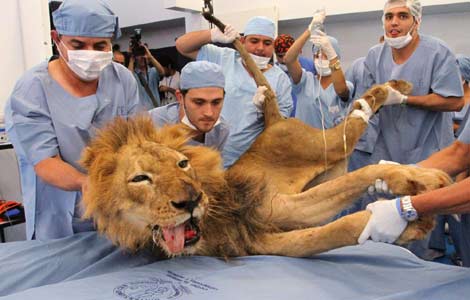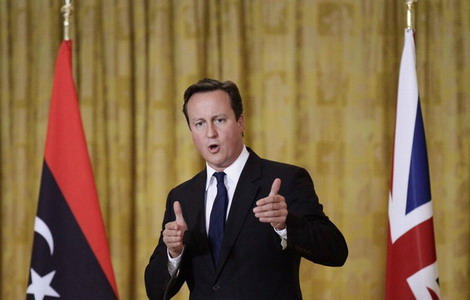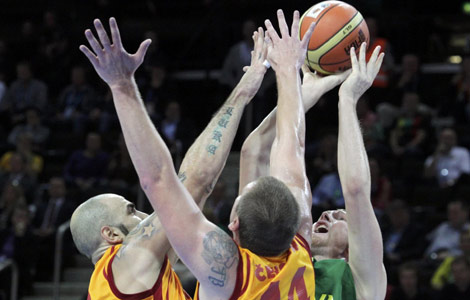UBS $2 b rogue trade suspect held in London
Updated: 2011-09-16 07:59
(Agencies)
|
|||||||||||
LONDON/ZURICH - Swiss bank UBS said it had lost around $2 billion due to rogue dealing by a London-based trader at the Swiss bank and police said they had arrested a man on suspicion of fraud.
Sources close to the situation named the suspect as 31-year-old Kweku Adoboli, who was working as UBS director of exchange traded funds and so-called Delta 1 trading, according to his profile on LinkedIn.
Adoboli was arrested during the night at UBS's London office, the sources told Reuters.
UBS said it discovered the problem on Wednesday afternoon, but gave no details of the alleged trades involved. Police said they had arrested a man on Thursday after being contacted by the bank and he was in custody .
Adoboli, a University of Nottingham computer science and management graduate, was described by a former landlord as a good tenant of a 1,000 pound ($1,600) per week apartment close to UBS in London's East End, where he lived until recently.
His father, John Adoboli, a retired United Nations employee from Ghana, said he knew the financial sector was a high risk area but he had no doubts about his son's competence and integrity.
"From what the reports are saying, it could be that he made a mistake or wrongful judgment," he told Reuters by phone from the Ghanaian port city of Tema, saying he had to speak to his son before drawing any conclusions.
"I've been calling his phone since and I am hoping he'd be granted bail soon so I can hear his side of the story," he said.
UBS stock ended the day down 10.8 percent, its lowest close since March 2009, after the bank said it might post a third-quarter loss due to the trading, a huge blow as it struggles to rebuild credibility after years of crises.
Late in the day, Moody's said it had placed the bank's long-term debt and deposit ratings on review for a possible downgrade, a further blow to the bank.
The loss effectively cancels out the 2 billion Swiss franc ($2.3 billion) saving UBS hoped to make in a cost-cutting drive detailed last month involving 3,500 job cuts.
It also threatens the future of UBS's investment bank, which is being reviewed by chief executive Oswald Gruebel as part of a wide-ranging restructuring after heavy losses during the credit crisis and a damaging scandal over bankers helping rich U.S. clients dodge taxes.
And it undermines claims by the Swiss bank and the industry that such events are a thing of the past.
UBS, which said no client positions were affected, is scheduled to hold an investor day on November 17 at which it was expected to announce a major overhaul of the investment bank.
"The matter is still being investigated, but UBS's current estimate of the loss on the trades is in the range of $2 billion," the bank said in a statement.
UBS employed almost 18,000 people in its investment bank at the end of June, most of them outside Switzerland, particularly in London and the United States.
"(This) is a staggering demonstration that all the clever systems that the banks now have, especially after the financial crisis, still cannot stop a determined individual getting round them if they want to," said Chris Roebuck, Visiting Professor at Cass Business School in London.
"It will yet again confirm to the majority of shareholders who are Swiss that investment banking is not 'proper' banking, as private banking is."
UBS had started to see client confidence return this year after it had to be rescued by the Swiss state in 2008 following massive losses on toxic assets held by its investment bank. The bank has had a history of major risk management glitches followed by repeated pledges to fix risk systems.
Kerviel
Any losses in UBS's investment bank risk scaring rich clients and prompting a further flight from its huge private bank, the core of its business that used to be the world's biggest wealth manager but has slipped to third place.
"This loss has the scope to have a material impact on the perception of UBS's private bank, impacting its future operating trends," Goldman Sachs analysts Jernei Omahen and Peter Skoog said in a note.
"Today's announcement therefore adds to the long list of arguments (and pressure) for a substantially smaller investment bank."
UBS's news caused disbelief among market operators.
The last similar case was when Jerome Kerviel, then a trader at Societe Generale, racked up a $6.7 billion loss in unauthorised deals revealed in 2008. Kerviel was sentenced to three years in prison in October 2010.
Both Kerviel and Adoboli were the same age when the scandal broke and both worked with so-called Delta 1 products, derivatives which closely track the underlying securities and give the holder an easy way to gain exposure to several asset classes. Examples include equity swaps, forwards, futures and exchange-traded funds.
"It is amazing that this is still possible," said ZKB trading analyst Claude Zehnder. "They obviously have a problem with risk management. Even when the amount isn't so high, it is once more a loss of confidence that casts UBS in a poor light."
Switzerland's financial markets regulator FINMA said it had been informed of the case and was in close contact with UBS, while a regulatory source said Britain's Financial Services Authority was in close contact with Swiss authorities.
Heads to roll?
The bank has in the past two years tried to rebuild the investment bank that nearly felled it during the financial crisis. It needed a state bailout after heavy losses on U.S. subprime mortgage-related securities.
Under Gruebel and investment bank boss Carsten Kengeter -- themselves both once traders -- it hired hundreds of traders in a bid to boost its bond business.
Several analysts said the incident made it more likely Kengeter would be in the firing line, while Gruebel could step down sooner rather than later.
"Gruebel saved the bank from destruction, so his main job is done. It is only a matter of time before he steps down. If it means he leaves a little sooner, it does not change a lot. But the investment bank is a bit of a disaster, and the knives will be out for Kengeter," said Peter Thorne, analyst at Helvea.
Former Bundesbank head Axel Weber is due to join the UBS board in May and take over as chairman in 2013.
The weak performance of the investment bank and tough capital rules in Switzerland had already attracted intense scrutiny over how UBS will cope. Analysts have called for a retrenchment, while Swiss politicians are debating how to make sure big banks can weather future crises without having to be bailed out by the state. ($1 = 0.870 Swiss franc)
Hot Topics
Libya conflict, Gaddafi, Oil spill, Palace Museum scandal, Inflation, Japan's new PM, Trapped miners, Mooncake tax, Weekly photos, Hurricane Irene
Editor's Picks

|

|

|

|

|

|







